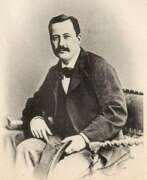Composers Impressionism
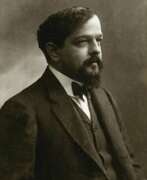

Claude Debussy, full name Achille-Claude Debussy, was a French composer, conductor, pianist and critic, a leading representative of Impressionism in music.
Debussy showed musical talent early and entered the Paris Conservatory. He lived in poverty, but at the same time he learned a luxurious life: the Russian philanthropist and the richest woman, Nadezhda Filaretovna von Meck, took him under her tutelage, he mused with her children and traveled with her around Europe. His sensitive nature could not but respond to all these contrasts. During this period Debussy created one of his masterpieces, Moonlight from the Bergamo Suite.
Debussy spent the summers of 1881 and 1882 near Moscow, at the von Meck estate. In this house Debussy became acquainted with the new Russian music of Tchaikovsky, Borodin, Balakirev and Modest Mussorgsky. His stay in Russia had a beneficial effect on the young musician's development. Debussy was also influenced by the work of Richard Wagner. He developed a highly original system of harmony and musical structure that in many ways expressed the ideals to which the Impressionist and Symbolist artists and writers of his time aspired.
Debussy toured with concerts and conducted his works in England, Italy, Russia and other countries. Claude Debussy's famous works include the Prelude to the Afternoon of a Faun (1894), the operas Pelléas et Mélisande and The Sea (1905), the suite Children's Corner (1906-1908) and the orchestral cycle Images (1912). In 1913 he composed music for the ballet Games, which was performed by Sergei Diaghilev's Russian Seasons company in Paris and London.
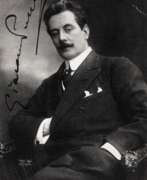

Giacomo Puccini, full name Giacomo Antonio Domenico Michele Secondo Maria Puccini, was an Italian opera composer, organist and choirmaster.
Puccini was born into the family that for two centuries directed the musical organization of the Cathedral of San Martino in Lucca, and the young musician inherited the position of cathedral organist until his adulthood. He also played organ in small local churches. Giuseppe Verdi's opera Aida, which he saw in Pisa in 1876, was a boost for him and he entered the Milan Conservatory in 1880.
Puccini carefully studied contemporary operatic compositions, particularly the work of Claude Debussy, Richard Strauss, Arnold Schoenberg, and Igor Stravinsky. Soon he wrote Triptych (1918), three one-act operas - the melodramatic The Cape, the sentimental Suor Angelica and the comic Gianni Schicchi. Puccini's other mature operas are La bohème (1896), Tosca (1900), and Madama Butterfly (1904).
The composer did not manage to finish his last opera, Turandot - he died of cancer with its score in his hands. This work is the only Italian opera in the Impressionist style. Puccini is also considered the greatest representative of opera realism, as well as the Verismo movement in music, attempting to faithfully portray the social and psychological conflicts of the new national-historical reality after the unification of Italy.
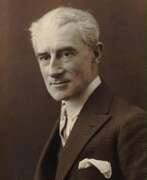

Maurice Ravel, full name Joseph Maurice Ravel, was a French composer, pianist and conductor, a representative of Impressionism in music.
At the age of 14 Maurice entered the Paris Conservatory and during his studies he composed several works. Already in these early sonatas and compositions he skillfully adapted traditional structures in music to his own personal ones, thus creating his own musical style.
Of Ravel's piano works, the virtuosic "Miroir" and "Gaspard de la Nuit" are popular, while of his orchestral works the most famous are the "Spanish Rhapsody" and Bolero. After 1905, Ravel's name is placed almost on a par with the recognized Impressionist composer Claude Debussy. Ravel met the famous Russian entrepreneur and organizer of the Russian Seasons, Sergei Diaghilev, which was a highlight in his career. He was specially commissioned by him to compose music for Mikhail Fokine's ballet Daphnis and Chloe (1912), starring the great Russian dancer Vatslav Nijinsky.
Ravel toured extensively as a pianist and conductor, performing his own works in Italy, Holland and England. In 1928, he made a successful four-month tour of Canada and the United States, where he impressed with jazz and blues compositions.
Maurice Ravel has gone down in history as one of the leading exponents of musical impressionism.
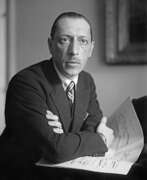

Igor Fedorovich Stravinskii (russian: Игорь Фёдорович Стравинский) was a Russian composer, a citizen of France and the United States. One of the greatest representatives of the world musical culture of the 20th century.
The future composer was born into a creative musical family. Igor Stravinskii's father was an opera singer, soloist of the Mariinsky Theater Fedor Stravinskii, and his mother was a pianist Anna Kholodovskaya. Igor studied music at home, the Stravinskiis were often visited by their friends: composers Caesar Cui and Nikolai Rimsky-Korsakov, critic Vladimir Stasov and writer Fyodor Dostoevsky. For five years from 1902 Igor Stravinsky studied with the composer Nikolai Rimsky-Korsakov. At the same time he became close to the impresario Sergei Diaghilev and the artists of the "World of Art" association.
Stravinskii 's first works were created under the influence of Rimsky-Korsakov and the French Impressionists, and his music bears a vivid imprint of the Russian cultural tradition. Igor Stravinskii's first ballet, The Firebird, was performed in June 1910 at the Paris Grand Opera House, and he later wrote music for Diaghilev's ballets Petrushka (1911) and Sacred Spring (1913). It was after the premiere of his ballets at Sergei Diaghilev's Russian Seasons in Paris that Stravinskii gained worldwide fame. The sets for his ballets were created by the artists Alexander Benois and Nikolai Roerich, the choreography was prepared by the famous dancers Vaclav Nijinsky and George Balanchine, and the costumes were designed by Coco Chanel herself.
In 1920 Stravinskii moved to France and in 1934 he took French citizenship. In Paris, the composer composed many works that became world-famous. In 1939 Igor Stravinskii moved to the United States and in 1945 he took American citizenship. During this period, he began to turn more to biblical themes and music of the pre-Brahmsian period.
From 1924 Stravinskii also performed as a pianist and conductor of his own works. In 1962, at the invitation of the USSR Ministry of Culture, Igor Stravinsky gave several concerts in Moscow and Leningrad (now St. Petersburg).
Critics believe that in recent years Stravinskii was moving further and further away from the Russian style, but the composer himself believed otherwise. On the basis of Russian folk songs, in 1965 he created a canon for orchestra, "Not a Pine Tree at the Gate Rocked". A year before his death, in 1966, the composer wrote the requiem "Funeral Chants", which he considered to be one of the major works of his life.
